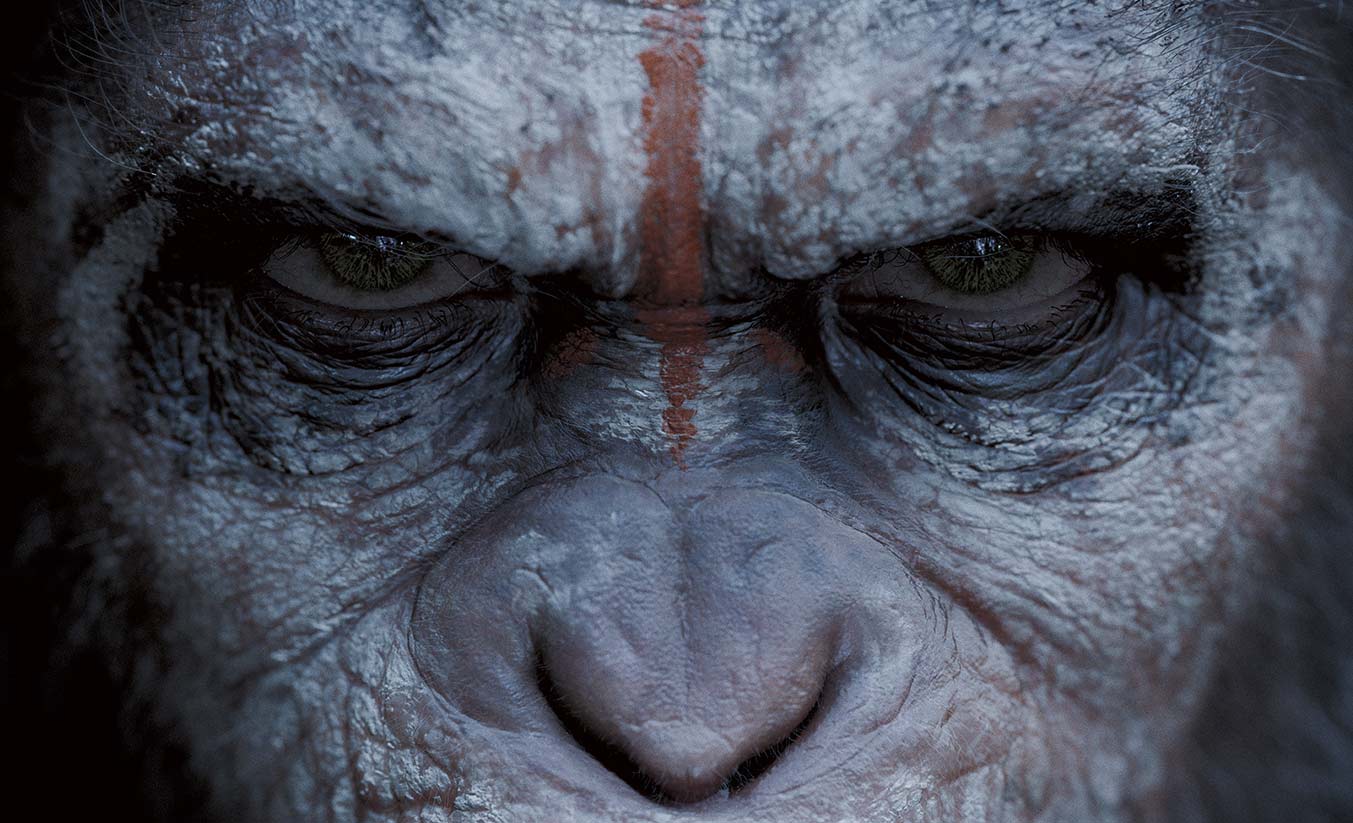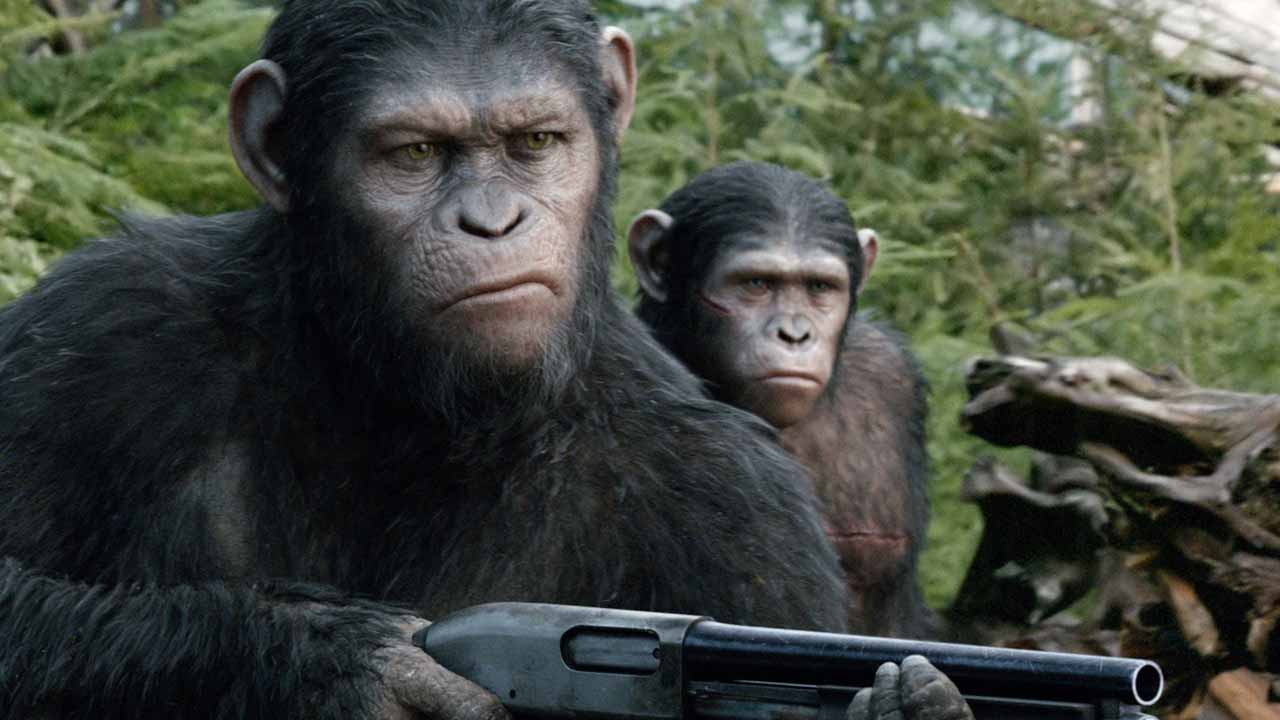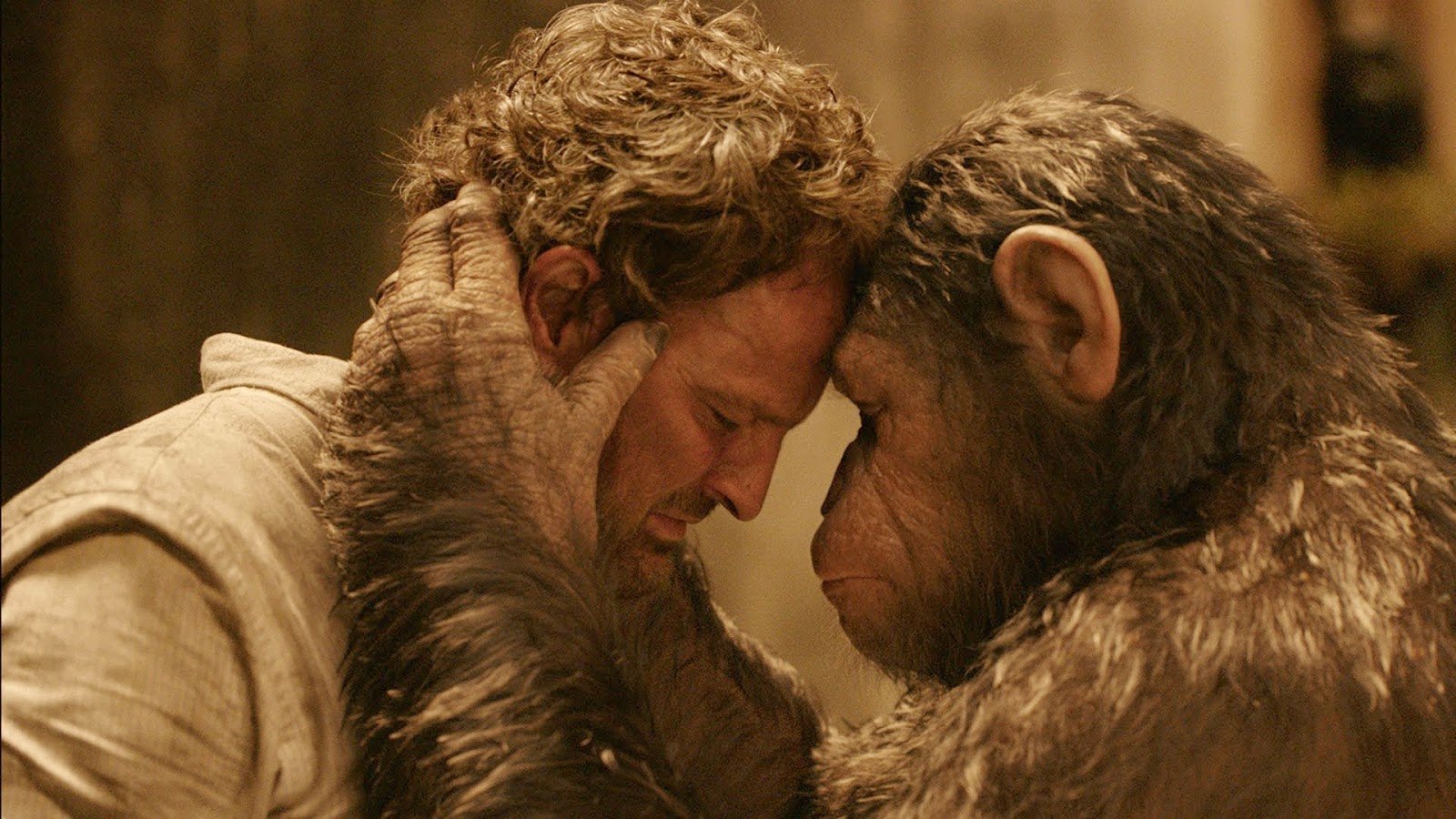
Dawn of the Planet of the Apes – Twentieth Century Fox
Dawn of the Planet of the Apes is about humanity’s deep-seated sinfulness—something theologians call total depravity. It’s also about the power of technology. Two themes that intertwine and inform each other in a powerful way. Dawn says something surprising about both.
(Mild spoilers for Dawn of the Planet of the Apes ahead)
Humanity’s lust for technological innovation ties together the plot of both Dawn and its predecessor, Rise of the Planet of the Apes (the franchise loves prepositions). In the first film, a botched lab experiment releases a virus that wipes out most of the population. It also makes apes smarter. Much smarter. The situation—over the ten year interval between Rise and Dawn—plays out in apocalyptic proportions. Humans become more like apes, savagely tearing each other apart, and apes, living in harmony, begin resembling the better part of humanity.
The first half of Dawn gives us a glimpse of these two very different, yet strikingly parallel groups. The first is a ragtag band of humans taking refuge in what’s left of San Francisco. With no power, the humans find themselves enveloped from the rest of the world. Their survival seems precarious at best. With hope dwindling, a man named Malcolm (Jason Clarke) takes a team into the forest to locate and repair a hydraulic power dam that may or may not turn the lights back on.
There the humans meet a second group of survivors: a fledgling ape community led by the fierce but caring Caesar (Andy Serkis)—the semi-protagonist of Rise of the Planet of the Apes. This advanced class of apes seem to be getting along just fine on their own. As one human character puts it, “They don’t need power.” Caesar and his followers live in harmony with one another. Their code of ethics is simple and to the point: “Ape not kill ape.”
An encounter between the two tribes sets into motion a series of events that ultimately leads to war. A war, on the surface, that seems to be the result of man’s quest for technology. Both communities live unaware of each other’s existence until the humans pursue technology (the dam). Tensions reach their breaking point when one of the apes, Koba, becomes aware of a large stockpile of weapons the humans have in their possession. We also can’t forget the events of Rise.

Andy Serkis plays Caesar in Dawn of the Planet of the Apes – Twentieth Century Fox
Yet, as much as technology is cast in a dim light, there are also flashes of its potential for good. In one poignant scene, Malcolm and a handful of humans hear music for the first time in nearly a decade. The sound of The Band’s classic hit “The Weight” brings with it a sense of wonder and nostalgia. About this time, Gary Oldman’s character, Dreyfus, breaks down as he looks at a digital picture of his deceased family—a moment made possible after his long-dead iPad receives power. Antibiotics also save the life of Caesar’s mate shortly after she gives birth to their son. Each of these glimpses provide a window into the good that technology can bring to the world around us.
Dawn seems to be poking at an idea here. An idea much deeper than simply dividing technology into black and white distinctions. Modern technology, in the film, isn’t interpreted as inherently virtuous or evil, it merely accentuates what’s already inside of us. It doesn’t cause war, it only provides the spark.
It’s easy to miss this point in our own pursuit, or deconstruction, of modern technology. Many of us feel compelled to choose between technological worship on one side and denial on the other. We either give technology too much credit or pass it off as the devil.
We can even be tempted to believe that technology—whether it be medical, scientific, or psychological—if used properly, can eventually eradicate evil forever. Yet, despite all that humanity has advanced, it has also regressed. The twentieth century, in terms of human violence, is the bloodiest century to date. In fact, new technology—coming to us as bombs, bullets, and modern warfare—has assisted humanity in their killing spree. Even if we were to eradicate all of this new technology, we would still find ourselves in just as bleak of a situation. Warfare might be more contained, but no less barbaric.

Jason Clark in Dawn of the Planet of the Apes – Twentieth Century Fox
Dawn seems to find a middle ground by highlighting an important principle regarding our pursuit of peace: as humans, we are deprived. Humanity is predisposed to selfishness and sin. Ephesians 2:5 describes this when Paul says that outside of Christ we are, “dead in our trespasses.“ No form of technology will ever change this. Notice the apes in the film. They were embedded in a nearly Edenic paradise. Yet, darkness still exists inside of them. This point is demonstrated in how fast Koba lusts for power, and how the rest of the fold quickly follows suit. Modern technology perpetuated this depravity, it did not create it. Take the guns and tank away, and something else would soon replace it.
As humans, we are sinful beings. Technology can be a wonderful aspect of society, but it can never eliminate evil. It only enhances what is already there. On the opposite side of the spectrum, the eradication of modern technology will not dissipate the darkness in our hearts. We should pursue technological development—and its restriction in some cases—but these actions alone will never provide complete relief. Like the apes and humans in Dawn, we are bound to an endless history of conflict and violence until we understand the doctrine of total depravity. We are bound to hurt each other and ourselves until we realize our need for a savior. We will never recreate Eden. Only one is able to do this. First in our lives, then in the life to come.
If you’d like to hear me discuss Dawn of the Planet of the Apes in more detail, check out the podcast I did with the crew at Reel World Theology.




